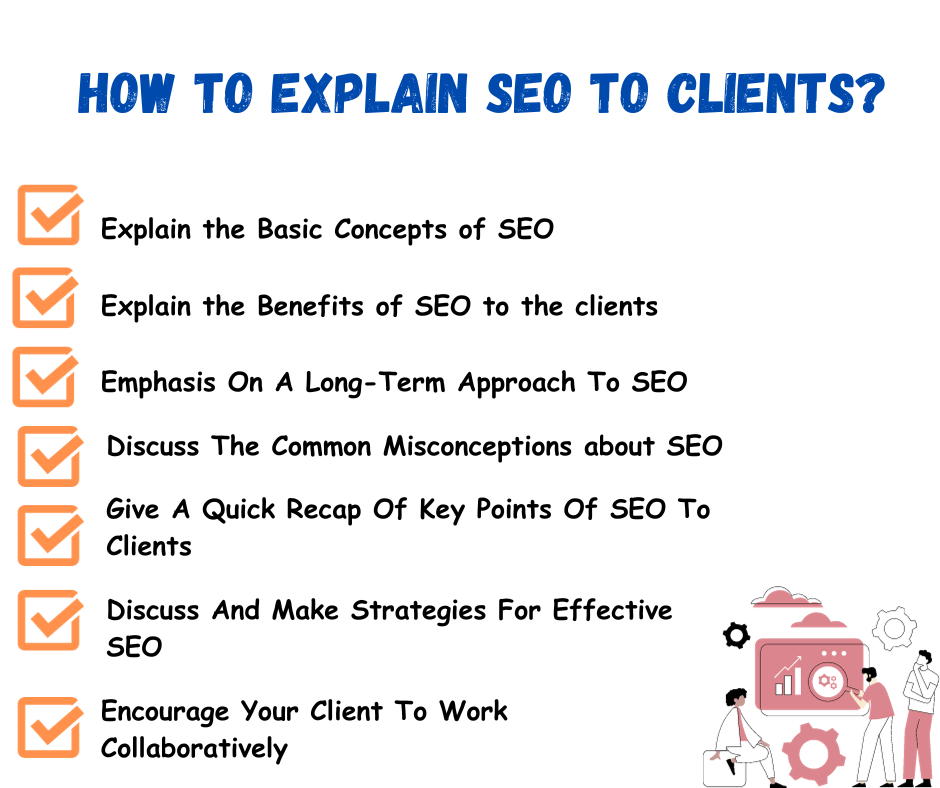SEO is a challenging task. Clients with little or sometimes no knowledge about the topic may find it difficult to understand. The algorithms for SEO are updated daily. In such scenarios, SEO service providers must make their clients understand SEO and educate them.
If you’re working in the digital marketing industry, explaining the Search Engine Optimization (SEO) concept to clients can be a bit challenging.
SEO is a complex topic that involves optimizing a website’s content and structure to rank higher on search engine results pages (SERPs) and drive more organic traffic to the site.
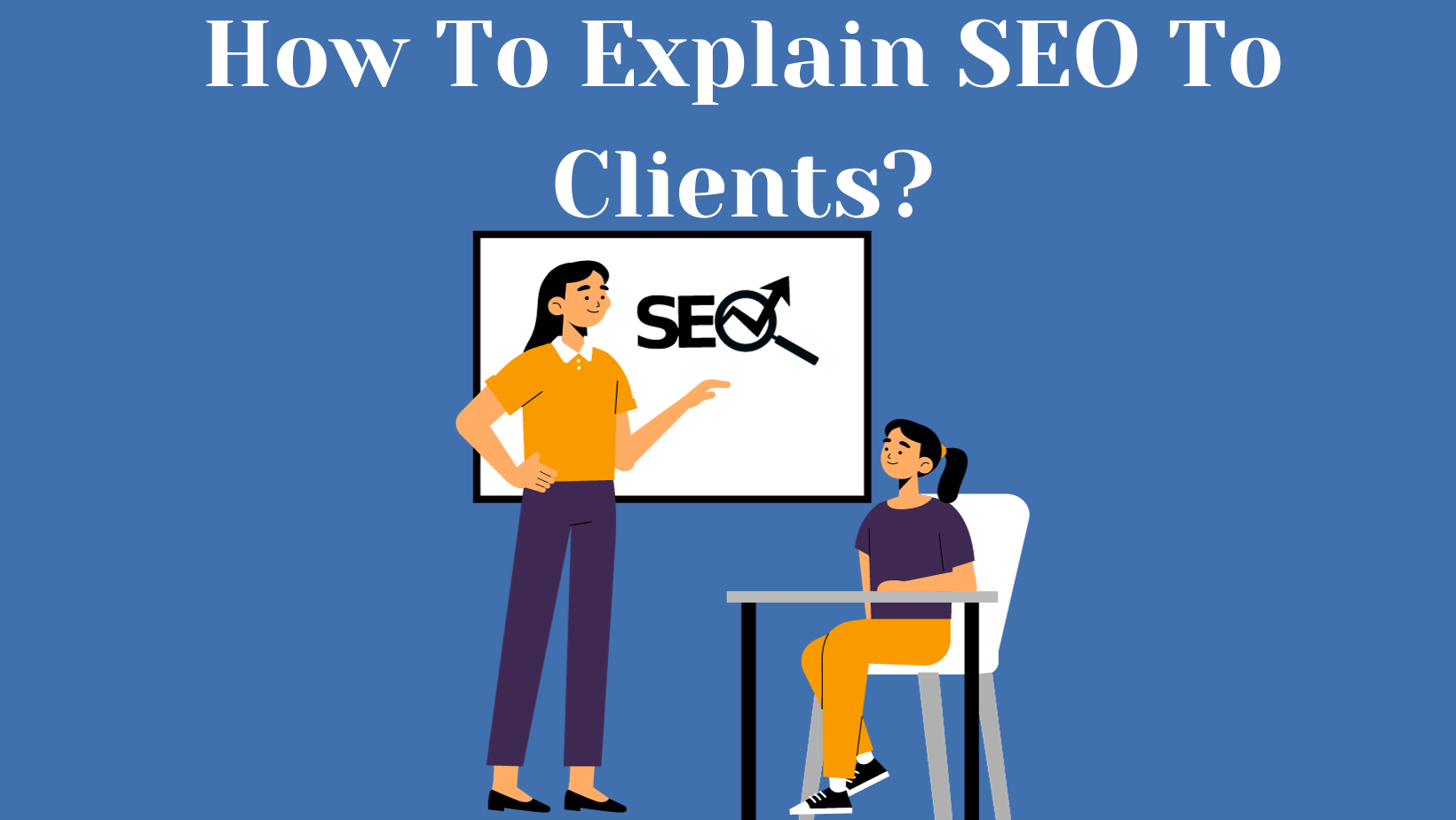
Clients unfamiliar with SEO concepts may have difficulty understanding how it works and why it’s important for their website’s visibility and success.
As a digital marketer, it’s important to have a clear and concise way of explaining SEO to clients, so they can understand the benefits and make informed decisions about their online marketing strategy. Let us see How To Explain SEO To Clients.
Page Contents:
How To Explain SEO To Clients?
Every client has a different level of understanding. Keep this in mind you need to have a proper explanation plan for your clients to make them understand what SEO means.
The following step-by-step guide is the most general and precise answer to the question How To Explain SEO To Clients?
1. Explain the Basic Concepts of SEO
To start with, let’s define SEO (Search Engine Optimization) for the client. Tell them that the goal is to make your website more accessible to search engines and users, resulting in increased traffic and potential customers.
One of the most crucial elements of SEO is keywords and content. Describe the need for keyword research and the importance of incorporating them into the website’s content.
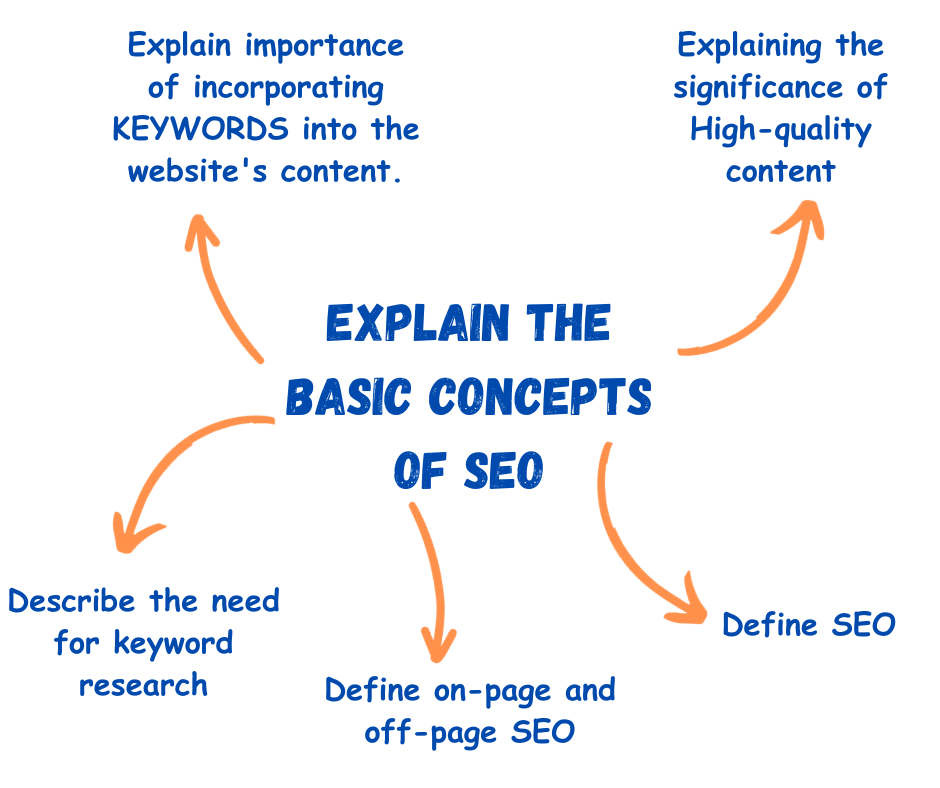
Explaining the significance of High-quality content that delivers value to the user is also important because it can help build the client’s website’s authority and credibility.
Another important aspect of SEO is on-page and off-page optimization. Define on-page and off-page SEO to your client and tell them how these will affect their business.
By making them understand these basic concepts of SEO, you can develop and implement an effective strategy with your clients to improve their website’s search engine visibility and attract more potential customers to the business.
2. Explain the Benefits of SEO to the clients
As your clients have understood the basic concepts of SEO. Now it is time to explain the benefits of SEO to clients. It’s important to highlight the many advantages that a well-executed SEO strategy can offer. Start by telling about the most significant benefit is increased visibility and traffic to the client’s website.
They should be aware of how optimizing the website’s content and structure for search engines, can help them rank higher in search engine results pages, making it more likely that potential customers will find and visit the site. Another important point to explain here is that SEO can help improve the user experience of the website.
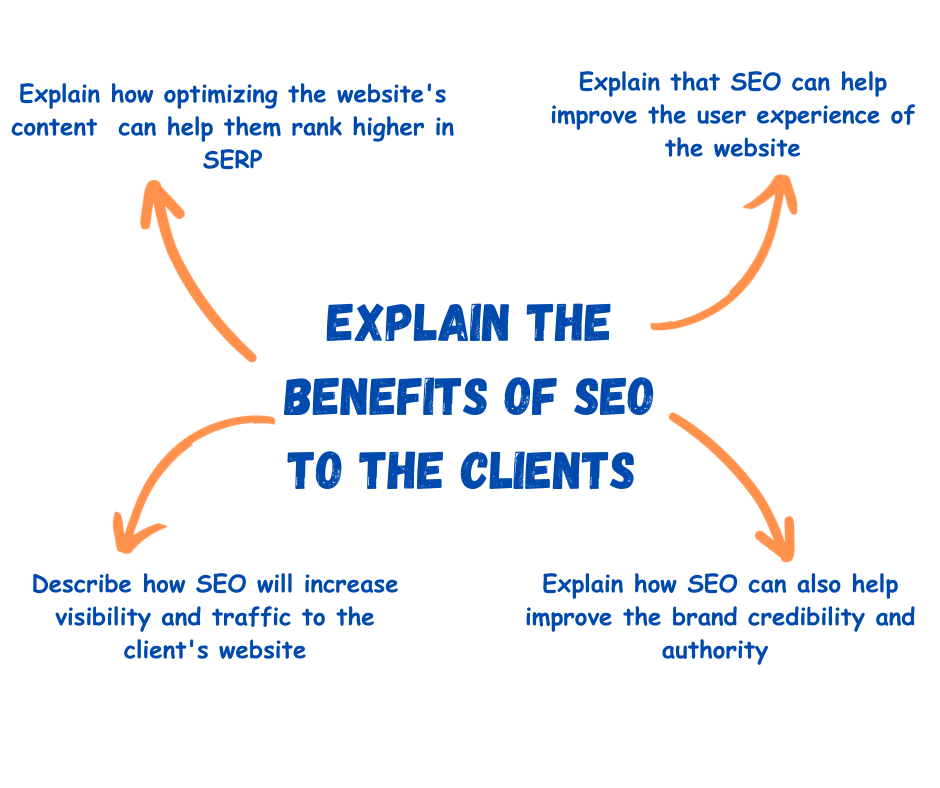
By optimizing the website’s content, structure, and navigation, users will have an easier time finding the information they’re looking for and engaging with the site’s content. This can lead to increased engagement, longer visit times, and ultimately, more conversions.
Explain to them how SEO can also help improve the brand credibility and authority of the client’s website. By ranking higher in search engine results pages, the website is seen as more trustworthy and authoritative, which can help build brand recognition and loyalty over time.
Finally, they can now figure out that there are many compelling reasons to invest in SEO as part of a broader digital marketing strategy, and it’s important to communicate these benefits clearly and effectively to clients.
3. Emphasis On A Long-Term Approach To SEO
When it comes to SEO, it’s important to adopt a long-term approach. This means focusing on sustainable strategies that will yield results over time, rather than quick fixes that may provide short-term gains but ultimately harm your website’s performance in the long run. Make your client aware of these long-term practices.
A long-term SEO strategy involves creating high-quality content that is valuable to your target audience, optimizing your website for relevant keywords, building high-quality backlinks, and ensuring your website is technically sound.
explain to them how they can be benefited by taking a long-term approach to SEO. How can this improve improve website’s visibility, drive more traffic, and ultimately achieve its business goals?
4. Discuss The Common Misconceptions about SEO
Many people have misconceptions about SEO (Search Engine Optimization). You need to discuss your client’s views on SEO. Make sure you clear all the misconceptions they have about SEO.
One common misconception usually clients have is that SEO will provide quick results. However, make them understand that the truth is that SEO is a long-term process that requires patience and consistency.
It may take several months to see significant results, and even then, the work isn’t done. SEO requires ongoing maintenance and adjustments to keep up with search engine algorithm updates.
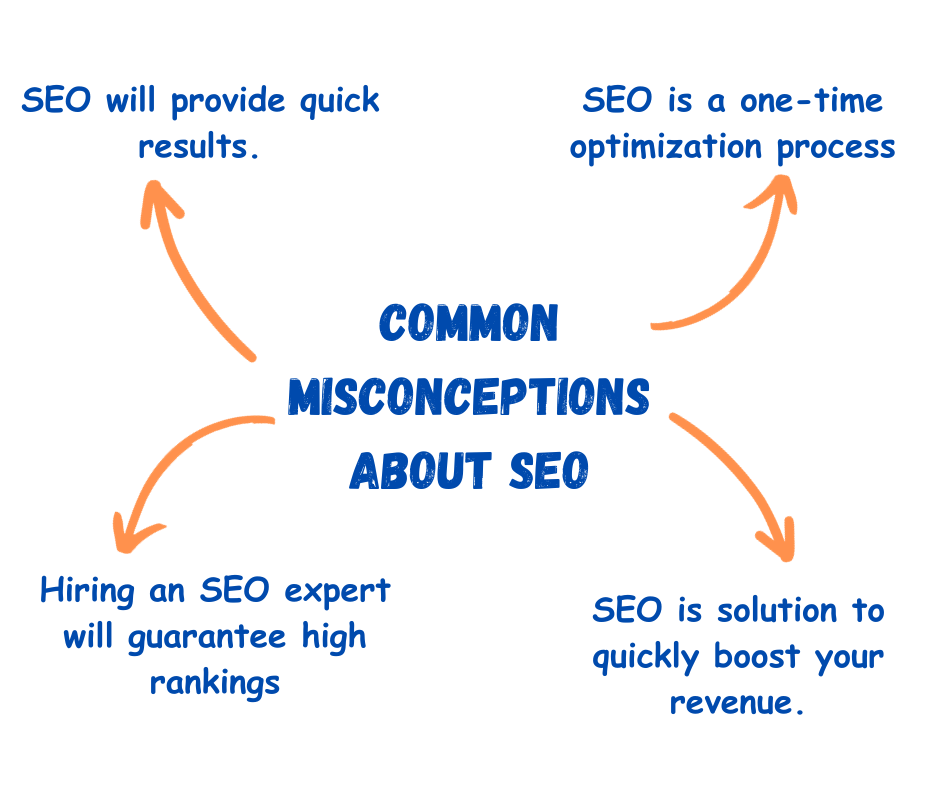
Another misconception people have is that hiring an SEO expert will guarantee high rankings on search engine results pages (SERPs). While SEO experts are knowledgeable and can improve your website’s chances of ranking higher, there are no guarantees in SEO.
Search engines use complex algorithms to determine rankings, and these algorithms are constantly changing. It’s important to set realistic expectations and understand that SEO is not a magic solution to quickly boost your rankings.
Some people also believe that SEO is a one-time optimization process. They think that once they’ve optimized their website, they’re done with SEO forever. However, this isn’t the case.
The client should understand that SEO is an ongoing process that requires continuous monitoring and adjustments. Factors like new competitors, changes in search engine algorithms, and updates to your website can all impact your SEO efforts and require further optimization.
5. Give A Quick Recap Of Key Points Of SEO To Clients
When explaining SEO to clients, it’s important to cover the key points thoroughly. Before moving to the strategy step again give a recap cap for all the important elements of the SEO process. Here are some important things to be repeated:
1. Explain the importance of using the right keywords in content, and how they help search engines understand what a page is about.
2. On-page optimization includes optimizing title tags, meta descriptions, headers, and content to make sure they are relevant to the target keyword.
3. Off-page optimization involves building quality backlinks to a website from other trustworthy sites, which shows search engines that the site is an authority on the subject.
4. Technical SEO includes ensuring that a website is mobile-friendly, has fast loading speeds, and is easily crawlable by search engines.
5. Explain how to measure the effectiveness of SEO efforts using tools like Google Analytics, which can provide valuable insights into traffic and user behavior.
A quick recap covering these key points will help clients to better understand how SEO works and how it can benefit their business. In this way, you will be able to clear all their doubts and ensure that clients are not only aware of the SEO but also know about it.
6. Discuss And Make Strategies For Effective SEO Communication With Your Clients
When discussing and making strategies for effective SEO communication with your clients, it’s important to keep a few key things in mind. Try to involve the clients in the SEO process as much as you can, and keep them aware of what are you doing for their website’s SEO.
Firstly, using simple and understandable language can go a long way in making sure your clients can follow along and understand the process.
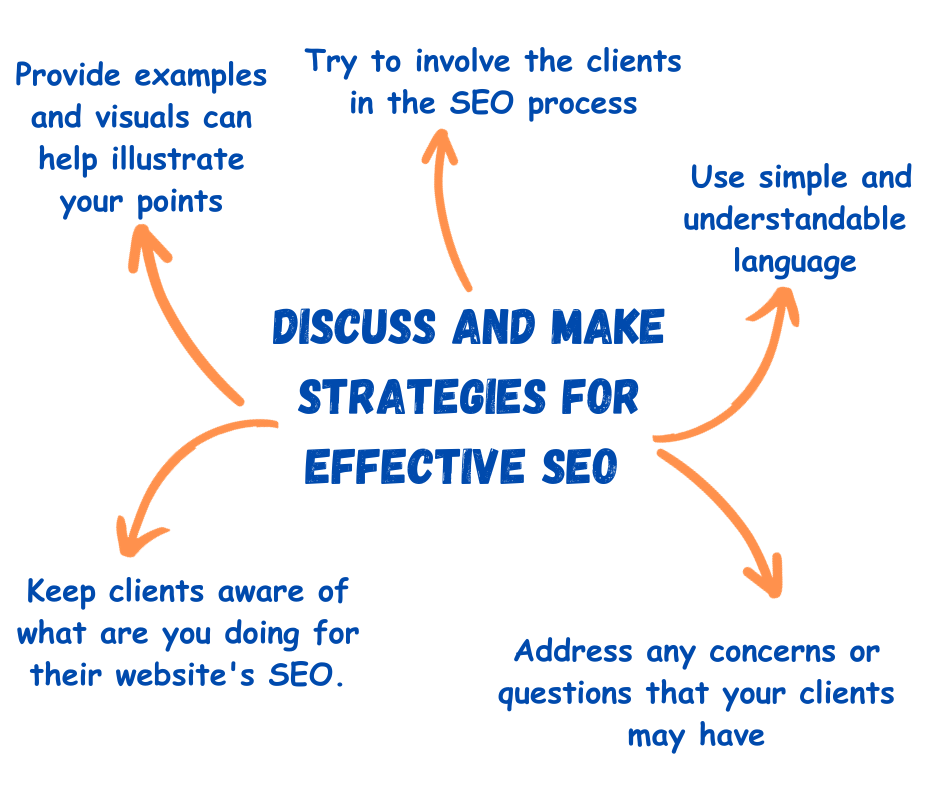
Additionally, providing examples and visuals can help illustrate your points and ensure that your clients have a clear idea of what you’re discussing.
Finally, it’s important to address any concerns or questions that your clients may have, as this can help to build trust and ensure that everyone is on the same page. By keeping these things in mind, you can ensure that your SEO communication is effective and successful.
7. Encourage Your Client To Work Collaboratively For Successful SEO Implementation
To achieve successful SEO implementation, it’s important to work collaboratively with clients. This means involving clients in the process of defining goals, identifying target audiences, and selecting appropriate keywords.
It also means working with clients to develop content that aligns with their brand voice and messaging while incorporating the chosen keywords. Collaboration also extends to monitoring and analyzing performance data from SEO efforts to make informed decisions on adjusting strategies.
By working closely with clients throughout the SEO implementation process, it’s possible to achieve the best possible results that align with their goals and objectives.
